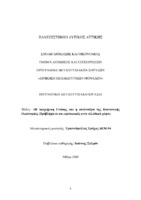| dc.contributor.advisor | Σαλμόν, Ιωάννης | |
| dc.contributor.author | Σπάχος, Τριαντάφυλλος | |
| dc.date.accessioned | 2018-04-24T10:39:31Z | |
| dc.date.available | 2018-04-24T10:39:31Z | |
| dc.date.issued | 2018-03-27 | |
| dc.identifier.uri | http://okeanis.lib2.uniwa.gr/xmlui/handle/123456789/4215 | |
| dc.description.abstract | Οι επιχειρήσεις παγκοσμίως εκτίθενται σε ένα περιβάλλον που μεταβάλλεται διαρκώς και επηρεάζεται ιδιαίτερα από τεχνολογικές, πολιτικές και επιστημονικές αλλαγές. Οι αγορές αλλάζουν και ο διεθνής ανταγωνισμός εντείνεται. Σε αυτό το πλαίσιο, η σύγχρονη επιχείρηση καλείται να αναπτύξει συστηματικούς και μεθοδικούς μηχανισμούς διοίκησης και ανάπτυξης της γνώσης, να διευκολύνει τη διάχυση της υπάρχουσας και να διευκολύνει τη δημιουργία καινούργιας γνώσης.
Παράλληλα στο πεδίο της κοινωνικής οικονομίας παρατηρείται έντονη κινητικότητα τις τελευταίες δεκαετίες. Αυτό οφείλεται στο γεγονός ότι η κοινωνική οικονομία κατάφερε, στο πλαίσιο της οικονομικής κρίσης, να δώσει διέξοδο στις ολοένα αυξανόμενες ανάγκες για κοινωνικές δομές στήριξης των πιο ευπαθών ομάδων των κοινωνιών. Η εργασία χωρίζεται σε δύο μέρη: στο πρώτο και πιο σύντομο αφιερώνονται δύο κεφάλαια, στα οποία εξετάζεται η δημιουργία οργανωσιακής γνώσης στις σύγχρονες επιχειρήσεις. Στο δεύτερο και εκτενέστερο που αποτελείται από πέντε κεφάλαια, εξετάζεται ο κλάδος της κοινωνικής οικονομίας. Στο πρώτο κεφάλαιο γίνεται λόγος για τη δημιουργία ενός νέου μοντέλου οργανωσιακής γνώσης μέσα από την σύνθεση των δύο ειδών γνώσης, της ρητής και της άρρητης. Στο δεύτερο κεφάλαιο γίνεται σύγκριση των υπαρχόντων μοντέλων διοίκησης παγκοσμίως και λαμβάνει χώρα μια προσπάθεια σύνθεσης τους. Στο τρίτο κεφάλαιο διερευνάται το ιστορικο πλαίσιο δημιουργίας και παρουσίας της κοινωνικής οικονομίας σε παγκόσμιο επίπεδο και ακόμη, γίνεται απόπειρα αποσαφήνισης βασικών όρων της. Στο τέταρτο κεφάλαιο εξετάζεται η εξάπλωση της κοινωνικής οικονομίας στον ευρωπαϊκό χώρο και ο βαθμός αποδοχής της στις χώρες που απαρτίζουν την Ευρωπαϊκή Ένωση. Στο πέμπτο κεφάλαιο γίνεται λόγος για τον βαθμό διείσδυσης της κοινωνικής επιχειρηματικότητας στην Ευρώπη και περιγράφονται οι πολιτικές και τα χρηματοδοτικά εργαλεία που η Ευρώπη έχει ή θα υιοθετήσει για την περαιτέρω ανάπτυξη της.
Στο έκτο κεφάλαιο η εργασία μπαίνει πια στη διερεύνηση της ελληνικής πραγματικότητας στον χώρο της κοινωνικής οικονομίας. Εξετάζεται η διαχρονική της παρουσία και η εισαγωγή στην ουσία τα τελευταία χρόνια της κοινωνικής επιχειρηματικότητας. Τέλος, στο έβδομο κεφάλαιο γίνεται εκτενής αναφορά στους αγροτικούς συνεταιρισμούς που αποτελούν την κορωνίδα της ελληνικής κοινωνικής οικονομίας. | el |
| dc.format.extent | 135 | el |
| dc.language.iso | el | el |
| dc.publisher | Α.Ε.Ι. Πειραιά Τ.Τ. | el |
| dc.rights | Αναφορά Δημιουργού-Μη Εμπορική Χρήση-Όχι Παράγωγα Έργα 3.0 Ελλάδα | * |
| dc.rights.uri | http://creativecommons.org/licenses/by-nc-nd/3.0/gr/ | * |
| dc.subject | TPSH::Διοίκηση και Οργάνωση::Κοινωνική Ευθύνη της Επιχείρησης | el |
| dc.subject | TPSH::Κοινωνικές Επιστήμες::Οικονομική | el |
| dc.title | Η διαχείριση γνώσης και η κουλτούρα της κοινωνικής οικονομίας. Προβλήματα και προοπτικές στον ελλαδικό χώρο | el |
| dc.type | Μεταπτυχιακή εργασία | el |
| dc.contributor.committee | Σπυριδάκος, Αθανάσιος | |
| dc.contributor.master | Διοίκηση Εκπαιδευτικών Μονάδων | el |
| dc.subject.keyword | Διαχείριση γνώσης | el |
| dc.subject.keyword | Κοινωνική οικονομία | el |
| dc.subject.keyword | Κοινωνική επιχείρηση | el |
| dc.subject.keyword | Οργανωσιακή γνώση | el |
| dc.subject.keyword | Αγροτικοί συνεταιρισμοί | el |
| dc.subject.keyword | Κοινωνικές συνεταιριστικές επιχειρήσεις | el |
| dc.subject.keyword | Κοινωνική επιχειρηματικότητα | el |
| dc.subject.keyword | Εταιρική κοινωνική ευθύνη | el |
| dc.description.abstracttranslated | Businesses worldwide are exposed to an environment that is constantly changing and is particularly affected by technological, political and scientific changes. Markets are changing and international competition is intensifying. In this context, modern enterprise is called upon to develop systematic and methodical mechanisms of knowledge management and development, to facilitate the dissemination of existing knowledge and to facilitate the creation of new knowledge. At the same time, in the field of social economy, there has been strong movement in recent decades. This is due to the fact that the social economy has managed, in the context of the economic crisis, to provide an outlet to the ever-increasing needs for social structures to support more vulnerable groups of societies. This thesis is divided into two parts: to the first and shortest part are devoted two chapters, which examine the creation of organizational knowledge in modern enterprises. In the second and most extensive part consisting of five chapters, the social economy sector is being examined. In the first chapter we talk about the creation of a new model of organizational knowledge through the synthesis of two kinds of knowledge, explicit and implied. In the second chapter there is a comparison of the existing management models in the world and an attempt is made to synthesize them. The third chapter explores the historical context of the creation and presence of the social economy at a global level, and an attempt is made to clarify its basic terms. The fourth chapter examines the spread of social economy in Europe and its degree of acceptance in the countries that make up the European Union. The fifth chapter talks about the degree of penetration of social entrepreneurship in Europe and describes the policies and financial instruments that Europe has or will adopt for its further development. In the sixth chapter, the work is now exploring the Greek reality in the field of social economy. It examines its diachronic presence and the introduction to the substance of social entrepreneurship in recent years. Finally, in the seventh chapter there is an extensive reference to the agricultural cooperatives that constitute the crown of the Greek social economy. | el |


